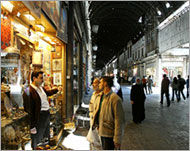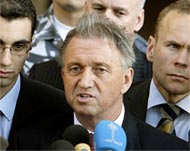Bolton pushes for new Syria resolution
US Ambassador John Bolton has said he wants another UN resolution forcing Syria to withdraw any intelligence agents it keeps in Lebanon.

“We certainly see a resolution that continued to push for full implementation of 1559,” Bolton said, referring to the measure adopted in September 2004 demanding the withdrawal of foreign forces from Lebanon and the disbanding of militia.
He said such a resolution would not be drawn up for several weeks. “The conclusion of 1559 that Lebanon should be restored to full sovereignty and territorial integrity has not been met,” he said.
Russia and other Security Council members have indicated they are unwilling to support further action.
Bolton was speaking on Wednesday after Security Council consultations on a 26 October report from special UN envoy Terje Roed-Larsen, who said Syria had withdrawn all its troops but no one could be sure if agents still remained. He also said arms were still flowing to Palestinians and other militia in Lebanon.
 |
|
The Syrian Deputy PM said his |
Russia’s UN ambassador, Andrei Denisov, thought another measure would be “overkill”. On Monday the council adopted a tough resolution ordering Syria to detain officials suspected in a plot to kill former Lebanese prime minister Rafiq al-Hariri or face possible punitive action.
“How many times can you kill one person – two times, five times or 10 times when one time is enough?” Denisov asked. “And that is the case here.”
Other Security Council diplomats said they had no immediate plans to pass another resolution.
Arms smuggling
Roed-Larsen’s report said weapons were still being smuggled across the Syrian border to Palestinian refugee camps in Lebanon but he would not say whether Damascus was responsible.
“It is not disputed by the government of Syria nor the government of Lebanon that there are arms flows and even that there have been massive arms flows across the border,” albeit in both directions, Roed-Larsen said after the consultations.
He told reporters he was not in a position to say who supplied the arms.
Syria’s UN ambassador, Fayssal Mekdad, denied his government was shipping weapons to Lebanon.
“Syria will not allow this, did not allow this. This is not in the interest of either Syria or Lebanon,” Mekdad said. “Our position is not to allow any such activity.”
Hizb Allah talks
Roed-Larsen said he was encouraged that the leader of the Hizb Allah resistance group, also a legal party in Lebanon, was talking to the Lebanese government about its status.
 |
|
Roed-Larsen said weapons were |
“I found that an encouraging and a very productive comment,” he said. “What we are doing at this point is to encourage the government of Lebanon to go into a dialogue with the militia to disband and disarm consistent with 1559.”
Hizb Allah chief Shaikh Hassan Nasr Allah has spoken in favour of a dialogue but also said his group would not disarm as long as Israel was a threat.
Hizb Allah, also backed by Iran, takes credit for forcing Israeli troops to withdraw from South Lebanon in May 2000 after 22 years of occupation.
Syria unconcerned
As the potential threat of economic sanctions loomed over Syria, Damascus Deputy Prime Minister Abd Allah Dardari told Reuters his country could weather an embargo.
Monday’s Security Council resolution did not include sanctions but warns of “further action” that could include an embargo if the UN considers Syria to be uncooperative with the al-Hariri probe.
|
“How many times can you kill one person – two times, five times or 10 times when one time is enough?… And that is the case here.” Andrei Denisov, |
Dardari said Syria’s ample foreign reserves and small debt would give it resilience against any sanctions.
“The past years of relative isolation are proving to be somehow useful as we are self-sufficient in many areas,” Reuters quoted Dardari as saying.
“In our dealings we are stronger because we are less dependent and the economy is less exposed to foreign external pressures,” said Dardari, whose country produces 450,000 barrels per day (bpd) of crude oil and exports about 250,000 bpd.
However, Dardari acknowledged that international sanctions would still disrupt trade, especially with the European Union, the destination for half of Syria’s exports and the origin of 37% of its imports.
“There is no country that is 100% self sufficient. It’s stupid to think we are not going to be affected to some extent,” he said.